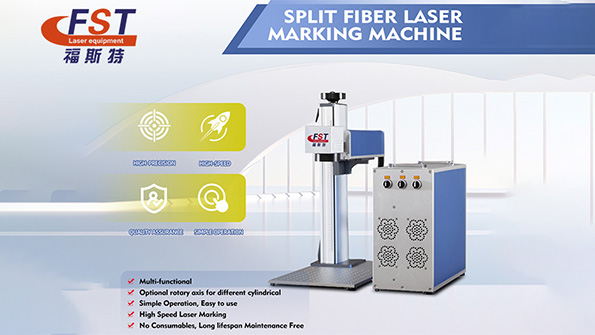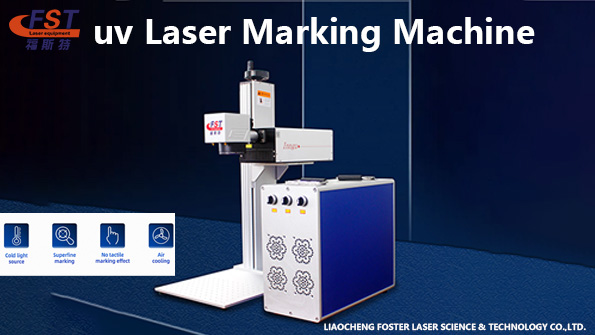In modern industrial manufacturing, laser marking technology has become a vital processing method thanks to its high efficiency, precision, non-contact operation, and permanence. Whether
used in metalworking, electronics, packaging, or customized crafts, selecting the right laser marking machine is essential to ensure optimal results and improve production efficiency.
Foster Laser specializes in the research and development of laser equipment, with years of industry experience. Our wide range of laser marking machines delivers reliable performance to
meet the diverse needs of various industries and applications. This guide will walk you through the types of machines, key configurations, and selection tips to help you choose the most suitable
laser pmarking solution.
Common Types of Laser Marking Machines & Their Applications
First Fiber Laser Marking Machine
Fiber lasers are low-thermal-load sources that excel at marking and engraving metals such as stainless steel, aluminum, copper, and various metal alloys. Their key advantages include high
energy density, fast marking speed, excellent clarity, and relatively low equipment cost, making them highly cost-effective.
Foster’s fiber laser marking machines are optimized with advanced optical systems and control technology, offering faster marking response and higher precision—ideal for metal processing
industries.
Second CO₂ Laser Marking Machine
CO₂ lasers emit at a wavelength of 10.6μm, which is readily absorbed by non-metallic materials like wood, paper, leather, and glass. This makes them well-suited for woodcrafts, leather goods,
packaging labels, and similar applications.
Foster’s CO₂ laser marking machines are also widely used in glass engraving. By precisely controlling laser output, they can create clear and stable patterns or text on glass surfaces.
Equipped with high-power lasers and precise control systems, they ensure reliable processing across various materials and thicknesses.
Third UV Laser Marking Machine
Known as the “universal marking solution,” UV lasers operate at a 355nm wavelength and generate minimal heat, making them ideal for heat-sensitive materials such as plastics, glass, acrylic,
and electronic components.
Foster’s 355nm UV laser marking machines feature exceptional beam quality and high operational stability. They allow ultra-fine marking with minimal thermal impact, making them the top choice or high-end electronics, precision components, and personalized customization markets.
Key Configuration Considerations for Laser Marking Systems
First Marking Area: Relationship Between Field Lens & Laser Power
The marking area is primarily determined by the focal length of the field lens and the laser power. A longer focal length allows for a larger marking area but reduces energy density.
For example:
A 30W fiber laser is best paired with a field lens of up to 150mm to maintain clarity.
A 100W laser can support a marking area up to 400mm × 400mm.
If deep engraving or cutting is required, a shorter focal length is recommended to concentrate the laser energy and improve the processing result.
Second Lifting Table: Adjustability for Varying Workpiece Thickness
Precise focus adjustment is critical during the marking process. The lifting table adjusts the distance between the laser head and the workpiece to accommodate varying heights.
In general, the recommended processing height should not exceed 50cm. Beyond that, accurate focusing becomes difficult, which may compromise marking quality.
Proper adjustment of the lifting platform ensures clear beam focus and enhances overall efficiency.
Third Control Board: The Core Component for Performance
The control board governs key laser parameters such as pulse width, frequency, and output power, directly affecting marking depth, clarity, and stability.
A high-quality control board offers greater parameter flexibility and supports more complex graphic processing. It enables precise power adjustments according to material hardness, ensuring
adaptability across different applications. As the control hub, its performance is crucial to the machine’s overall stability and marking quality.
Buying Tips & Foster Laser Brand Advantages
When choosing a laser marking machine, consider the following factors:
Material type (metal, non-metal, heat-sensitive materials)
Processing requirements (deep engraving, surface marking, large-area marking)
Power and field lens compatibility
Equipment stability and after-sales support
Backed by robust R&D and manufacturing capabilities, Foster Laser offers a full range of laser marking solutions—including fiber, CO₂, and UV systems—with customization options to meet
your specific production needs.
Choosing the right ezd laser marking machine is not just a purchase—it’s a strategic investment in your production process. Partner with Foster Laser to achieve efficient, precise, and professional
laser marking.
Post time: Jul-07-2025




